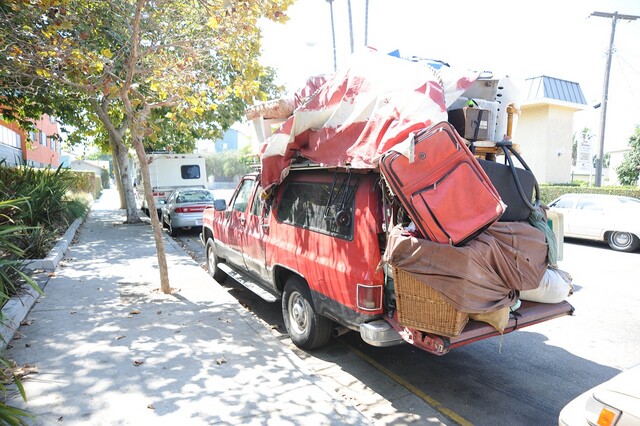Winning a Battle, But Losing the War: Court Overturns L.A. Ban on Living in Cars


A segment on KCET's award-winning TV show "SoCal Connected" was based on this story. Watch it here now.
Advocates for Los Angeles' homeless community say a federal court decision to overturn a local law banning people from living in parked vehicles is something of a Pyrrhic victory: Homeless people can now sleep in cars instead of on the streets, but a car is not a home.
With more people pouring into homeless shelters each day -- and as these shelters struggle to find enough beds for the homeless to sleep on -- advocates question whether the city is doing enough to provide people with shelter or permanent housing.
"People who have nowhere to live create alternative means of shelter," said Larry Adamson, president of The Midnight Mission. "At the core of this is a much bigger issue; this is just a symptom. We have not realistically addressed the need for housing for those who are homeless in our community."
The 9th Circuit U.S. Court of Appeals overturned the ban on using parked vehicles as "living quarters" on Thursday, describing the rule as vague and arguing it unfairly targets homeless people. The 1983 law promotes "arbitrary and discriminatory enforcement," because despite its broad scope, "it appears to be applied only to the homeless," the court said.
"Plaintiffs are left guessing as to what behavior would subject them to citation and arrest by an officer," the court wrote in its opinion. "Is it impermissible to eat food in a vehicle? Is it illegal to keep a sleeping bag? Canned food? Books? What about speaking on a cell phone? Or staying in the car to get out of the rain?"
The ordinance, the court added, violates the Due Process rights granted by the Fourteenth Amendment. Los Angeles officials said the ban was enforced for health and safety reasons. City Attorney Mike Feuer, whose office backed the law before the court, said he would not appeal the ruling and would work to "craft a constitutional ordinance that respects the rights and needs of homeless individuals and protects the quality of life in our neighborhoods."
"For many homeless persons, their automobile may be their last major possession -- the means by which they can look for work and seek social services," the court said. "The city of Los Angeles has many options at its disposal to alleviate the plight and suffering of its homeless citizens. Selectively preventing the homeless and the poor from using their vehicles for activities many other citizens also conduct in their cars should not be one of those options."
Living in a car or RV, Adamson admits, is not an ideal alternative to living on the streets -- it would be better to have the resources to provide more bed space.
"A car is not meant for human habitation," he said. "Having proper housing alternatives in the second largest city in the USA is not an unrealistic expectation. We should have those alternatives but we don't. We'll build a multi-billion-dollar bullet train to San Francisco, but we won't house our people?"
Mel Tillekeratne says the ruling was a long time coming. As director of the Monday Night Mission, he is no stranger to the plight of L.A.'s homeless -- he and a group of volunteers head to Skid Row five nights a week to feed those who are turned away from at-capacity area shelters.
"A ban on letting people live in their cars would completely deny short-term homeless people a chance at bouncing back," Tillekeratne said. "Not just individuals who maybe just lost their home or apartment, but so many people who become temporarily homeless due to issues like separation or family disagreements."
While other cities have laws barring overnight parking or sleeping in cars, L.A.'s ordinance banned people from using a parked vehicle as "living quarters either overnight, day-to-day or otherwise."
This isn't the first time the ban has stirred debate -- city officials created a task force in 2010 to cite and arrest homeless people in Venice following residents' complaints. A group of homeless people who were living in their cars sued the city in 2011, but lost in federal district court. Thursday's ruling reversed the lower court's decision.
The court's move highlights a lack of adequate permanent housing in Los Angeles, says Christine Marge of United Way of Los Angeles, an organization dedicated to helping L.A.'s homeless population. It's an acknowledgement that there aren't many options for people who live on the streets.
"What it does is begin to decriminalize some of the activities some people are doing to survive, but it's not a solution," she said. "It demonstrates the urgency of how unacceptable this is."